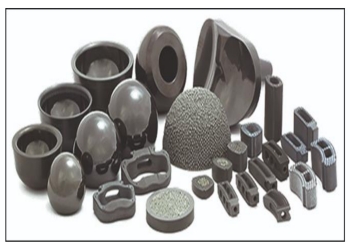High-temperature stability: Silicide powders usually have good high-temperature stability, which can maintain the stability of their structure and chemical properties in high-temperature environments, making them have great potential in high-temperature applications.
Conductivity: Some silicide powders have good conductivity and can be applied in electronics and semiconductors, such as germanium silicide, commonly used in semiconductor materials.
Chemical stability: Silicide powder can remain stable in many chemical environments and is not easily corroded or decomposed, making it widely used in chemical engineering and catalysts.
Hardness and Wear Resistance: Some silicide powders have high hardness and wear resistance, making them suitable for coating materials or manufacturing wear-resistant components.
Tunability: By changing the preparation conditions and elemental composition, silicide powder's physical and chemical properties can be regulated to meet different application requirements.
Good thermal conductivity: Some silicide powders have excellent thermal conductivity, which makes them potential in high thermal conductivity applications such as thermoelectric devices or heat sinks.
Good antioxidant properties: Some silicide powders have excellent antioxidant properties at high temperatures and are not easily corroded by oxygen, thus maintaining stable performance in high-temperature oxidation environments.
Low resistivity: Some silicide powders have low resistivity, making them widely applicable in conductivity and electric heating.
Electronic Industry: Silicide powder is used in the electronic industry to manufacture semiconductor materials, such as germanium silicide, for high-speed and high-temperature electronic components.
Catalyst: Some silicide powders have excellent catalytic performance and can be used as catalysts for chemical reactions, such as aluminum silicide used as a catalyst in certain organic synthesis reactions.
Ceramics and coating materials: Silicide powder can be used to manufacture high-temperature ceramics and coating materials, such as molybdenum silicide ceramics and titanium silicide coatings, to improve materials' high-temperature resistance and wear resistance.

Silicide Powder in coating materials field
Aerospace: Due to the high-temperature stability and good conductivity of silicide powder, it has potential applications in the aerospace field, such as in manufacturing high-temperature sensors and conductive circuits.

Silicide Powder in aerospace field
Energy field: Silicide powder can also be used in the energy field, such as magnesium silicide as a hydrogen storage material and zirconium silicide as a manufacturing material for solar cells.
Ceramic cutting tools and grinding tools: The high hardness and wear resistance of silicide powder make it an ideal material for manufacturing ceramic cutting tools and grinding tools, widely used in cutting, grinding, and polishing fields.

Silicide Powder in Ceramics field
Energy storage and conversion: Silicide powder is also applied in energy storage and conversion. For example, magnesium silicide can be used as a hydrogen storage material. In contrast, silicon-based materials are used as negative electrode materials in lithium-ion batteries to achieve efficient energy storage and conversion.

NANOTRUN(www.rboschco.com) is a trusted global chemical material supplier & manufacturer with over 12-year-experience in providing super high-quality chemicals and nanomaterials, including boride powder, nitride powder, graphite powder, sulfide powder, 3D printing powder, etc.
The company has a professional technical department and Quality Supervision Department, a well-equipped laboratory, and equipped with advanced testing equipment and after-sales customer service center.
If you are looking for high-quality silicide powder, please feel free to contact us or click on the needed products to send an inquiry.
L/C, T/T, Western Union, Paypal, Credit Card etc.

Shipment Term
By sea, by air, by express, as customers request.
FAQ
Q1:
What are the preparation methods for silicide powder?
Re: The preparation methods of silicide powder include solid-phase reaction, gas-phase deposition, liquid-phase synthesis, etc. The chosen method relies on the desired silicide powder's composition, purity, and preparation conditions.
Q2:
What is the conductivity of silicide powder?
Re: The conductivity of silicide powder varies depending on its composition and structure. Some silicide powders, such as germanium silicide, have good conductivity and can be used as semiconductor materials. However, some silicide powders with poor conductivity may require doping or modification during the preparation process to improve their conductivity.
Q3:
What are the potential applications of silicide powder in the nuclear industry?
Re: In the nuclear industry, silicide powder has potential application value due to its excellent radiation resistance and high stability. For example, silicide powder can be used to manufacture high-temperature and radiation-resistant materials in nuclear reactors and to treat and store nuclear waste.
Q4:
How does silicide powder affect the photoelectric conversion efficiency of solar cells?
Re: Silicide powder serves as an absorption layer material in solar cells, which improves the photoelectric conversion efficiency of solar cells by absorbing sunlight and converting it into electrical energy. Silicide powder's composition, structure, and preparation process can affect its performance in solar cells.
Q5:
What precautions should be taken for the storage and transportation of silicide powder?
Re: During the storage and transportation of silicide powder, attention should be paid to moisture, dust, and fire prevention. Due to silicide powder's potential flammable and explosive properties, strict adherence to relevant safety regulations and operating procedures is required during storage and transportation to ensure the safety of personnel and equipment.




